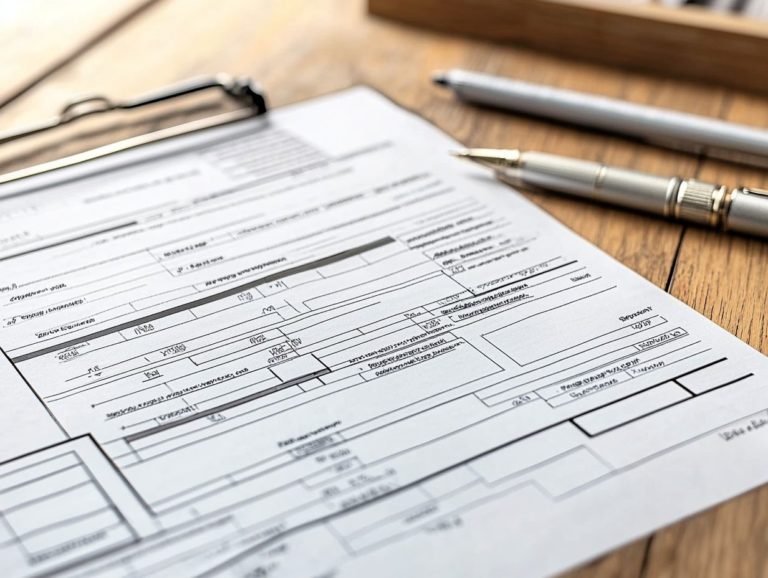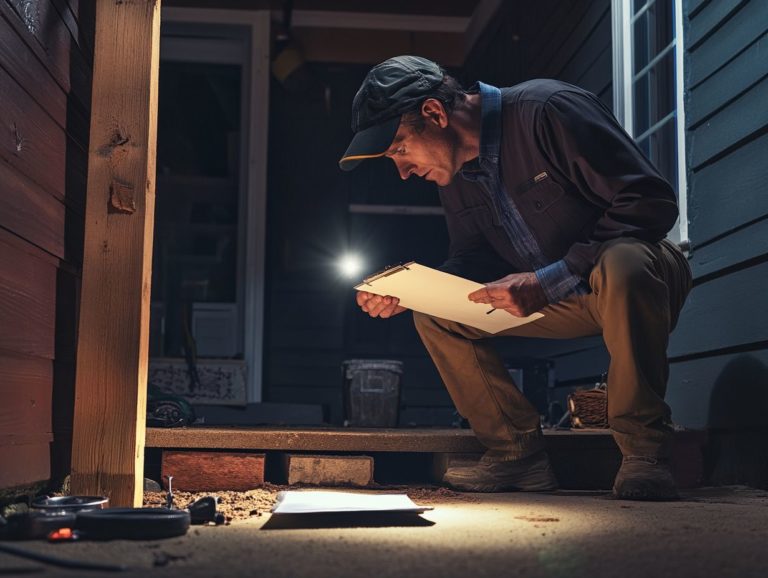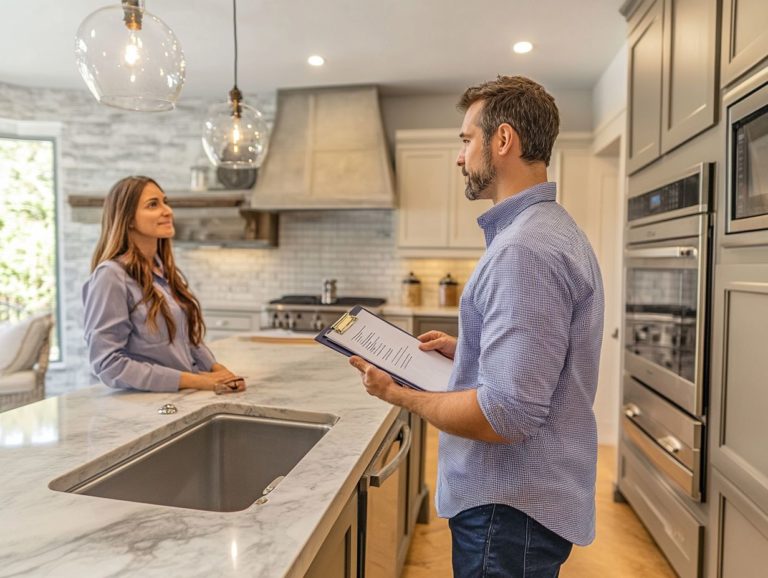How to Leverage Home Inspection Reports for Negotiation
When you’re buying a home, one of the most vital steps is the home inspection. The resulting inspection report can serve as a powerful ally in your negotiation process.
Grasping the purpose and process behind these reports enables you to pinpoint potential issues. This understanding gives you the upper hand when discussing repairs or credits with the seller.
This guide will equip you with the tools to effectively leverage home inspection reports in your negotiations. It highlights common pitfalls to steer clear of and alternative strategies to explore.
Armed with the right knowledge, you can navigate negotiations with confidence and secure a more favorable deal on your new home.
Contents
- Key Takeaways:
- The Importance of Home Inspection Reports
- Using Home Inspection Reports in Negotiation
- Tips for Effective Negotiation
- Common Pitfalls to Avoid
- How to Handle Difficult Sellers
- Alternative Strategies for Negotiation
- Frequently Asked Questions
- What is a home inspection report and why is it important for negotiation?
- Who typically pays for a home inspection report?
- Can I use a home inspection report to negotiate a lower price for a property?
- What are some other ways to leverage a home inspection report for negotiation?
- What should I do if the seller refuses to make any concessions based on the home inspection report?
- Is it common for home inspection reports to be used for negotiation?
Key Takeaways:

Understanding the purpose and process of home inspection reports is crucial for effectively leveraging them in negotiation.
Identifying areas for negotiation and leveraging repairs or credits can help you get the best deal on a home. Knowing how to read a home inspection report is crucial in this process.
Effective negotiation involves clear communication, collaboration with the seller, and a thorough understanding of the inspection report.
The Importance of Home Inspection Reports
Home inspection reports are essential in the real estate transaction process. They offer you vital insights into a property’s condition, empowering you to make informed decisions.
These reports detail various inspection findings. They highlight safety concerns, structural issues, and cosmetic defects, helping you pinpoint significant problems that could influence negotiations.
Understanding the significance of these reports greatly enhances your leverage in a seller’s market. Savvy negotiation strategies are crucial for securing favorable outcomes.
Understanding the Purpose and Process
The purpose of a home inspection is to evaluate the property’s condition. This ensures you are fully aware of any potential issues before finalizing your purchase.
This evaluation is essential for careful consideration in real estate transactions. During a typical home inspection, professionals will conduct a comprehensive examination of both the interior and exterior of the property.
They will assess major components, such as the roofing, plumbing, electrical systems, and the integrity of the foundation. Inspectors will also search for signs of mold, water damage, or pest infestations that could indicate deeper problems.
Understanding your inspection report is key to your success! It highlights areas that may need repair or attention, offering a realistic perspective on the property’s market value.
This understanding will help you make informed decisions. Grasping this now will empower you to negotiate effectively and secure your dream home!
Using Home Inspection Reports in Negotiation
Home inspection reports are invaluable assets in negotiations, as they provide you with the leverage needed to request repairs or negotiate price reductions. Understanding the role of home inspections in buyer-seller negotiations can further enhance your position.
When these reports uncover issues like heating, ventilation, and air conditioning malfunctions, plumbing troubles, or significant repairs, they empower you to advocate effectively for your interests.
Identifying Areas for Negotiation
Identifying the main issues in the home inspection report is your first step toward employing smart negotiation tactics. This analysis typically highlights key areas to be particularly attentive to, such as structural concerns that could include a compromised foundation or significant roof damage. For more insights, refer to our guide on understanding home inspection reports.
These problems not only affect the safety of the home; they can also lead to substantial repair costs later on. Safety hazards, such as outdated electrical systems or mold presence, pose risks to future occupants.
While cosmetic defects may seem less critical, they can still affect your emotional connection with the property. For example, if you discover during your inspection that the heating system is near the end of its lifespan, you have the advantage of negotiating a price reduction or requesting the seller replace the system before closing.
Such strategies empower you to navigate the negotiation process with confidence, ensuring you secure a fair deal while addressing potential issues right from the start.
Leveraging Repairs and Credits

Leveraging repair costs effectively gives you the power to request credits toward closing costs or negotiate for repairs to be completed before your purchase. This addresses your needs without significantly impacting the seller’s position.
To create a positive negotiation environment, analyze the inspection report thoroughly and prioritize issues based on their severity and potential impact on property value. Additionally, understanding how to negotiate repairs after inspection can further enhance your approach.
By framing your requests around these findings, you can present reasonable demands that reflect both the urgency of the repairs and the associated costs.
Sellers can show their willingness to cooperate by considering reasonable requests and proposing alternative solutions, such as offering a credit instead of handling the repairs themselves.
This approach builds trust and leads to quicker, more successful negotiations for everyone involved.
Tips for Effective Negotiation
Effective negotiations rely on clear communication and collaboration between buyers and sellers.
By understanding each party’s priorities, you can significantly influence the outcome of the deal in the competitive real estate landscape.
Communication and Collaboration with the Seller
Establishing effective communication and collaboration with the seller can prepare the ground for smoother negotiations, especially in a seller’s market where understanding each other’s positions is essential.
You can leverage strategic dialogue to express your needs clearly while demonstrating a genuine interest in the seller’s situation. This mutual understanding not only enhances the relationship but also leads to more informed decision-making.
Your agent plays a crucial role in this process; their expertise in negotiation tactics allows them to articulate your position effectively without alienating the seller. In a fluctuating market where emotions can run high, maintaining open lines of communication is vital.
This fosters trust and creates a platform for collaborative problem-solving, ultimately bridging the gap between both parties and increasing the likelihood of a successful transaction.
Negotiating from a Place of Knowledge and Understanding
Negotiating from a place of knowledge and understanding the nuances of inspection insights empowers you to present your demands with confidence, significantly enhancing the effectiveness of negotiations regarding repair requests or price concerns.
Being well-informed about inspection findings equips you with the essential details to substantiate your requests while instilling a sense of authority in discussions with sellers. This expertise enables you to articulate specific concerns that directly affect the property’s value and can be crucial when negotiating repairs after home inspection, creating leverage in the negotiation process.
For example, if certain repairs are deemed urgent, you can effectively communicate this urgency to strengthen your negotiating position. By highlighting inspection discrepancies, you can bolster your arguments for lowering the asking price or requesting concessions, ultimately leading to a more favorable outcome in your transaction.
Common Pitfalls to Avoid
Steering clear of common pitfalls in negotiations is vital for successfully navigating the real estate landscape. In this arena, even minor missteps can become deal breakers, derailing transactions and undermining your leverage as a buyer.
Mistakes to Avoid in Negotiation

Common negotiation mistakes can significantly undermine the effectiveness of your discussions, particularly when critical safety concerns are overlooked or significant issues from inspection findings are ignored.
Both buyers and sellers often underestimate the repercussions of these oversights, leading to agreements that may ultimately crumble or incur costly consequences later on.
Failing to meticulously review the home inspection report can cause buyers to miss essential details about structural integrity or safety hazards. Meanwhile, sellers may neglect defects that could deter potential buyers or weaken their negotiating stance.
Entering negotiations without preparation can leave both parties lacking a clear understanding of the property’s true condition and market value, creating unnecessary friction and dragging out the process.
How to Handle Difficult Sellers
Handling difficult sellers calls for strategic negotiation techniques that prioritize clear communication and empathy, empowering you to navigate challenging conversations with poise.
In these situations, understanding the seller’s perspective is crucial; it fosters mutual respect and paves the way for productive dialogue. Active listening is essential as it allows you to genuinely grasp the seller’s concerns and motivations.
By introducing collaborative problem-solving strategies, you can enhance the interaction, promoting a partnership approach rather than a confrontational one. Establishing common ground not only alleviates tension but also sets the stage for achieving satisfactory outcomes for both parties.
Ultimately, honing these people skills can greatly improve your negotiation results, turning potential conflicts into valuable opportunities for growth.
Alternative Strategies for Negotiation
If traditional negotiation tactics do not work, exploring alternative strategies opens up new avenues for you to meet your demands and secure a successful transaction.
Embracing these innovative approaches can enhance your negotiating power and lead to outcomes that align more closely with your goals.
Considering Other Options for Negotiation
Considering alternative negotiation strategies, such as offering credit toward closing costs or suggesting different repair requests, can give you an edge in a competitive market.
These tactics demonstrate your willingness to collaborate and alleviate the stress often associated with traditional bargaining methods. By exploring options like phased payments or flexible closing timelines, you can establish agreements that benefit both parties.
Tapping into local market insights like current economic conditions or comparable sales can bolster your negotiation position. Ultimately, thinking beyond conventional negotiation boundaries allows you to create win-win scenarios, fostering goodwill and paving the way for outcomes that favor everyone involved.
Frequently Asked Questions
Let’s dive into some common questions:
-
What is a home inspection report and why is it important for negotiation?

A home inspection report is a detailed examination of a property s condition, including any potential issues or defects. It is important for negotiation because it can provide crucial information that impacts the final sale price of a home.
-
Who typically pays for a home inspection report?
In most cases, the buyer is responsible for paying for a home inspection report. However, it is becoming more common for sellers to provide a copy of a recent inspection report to potential buyers as a way to attract more offers and show transparency in the sale.
-
Can I use a home inspection report to negotiate a lower price for a property?
Yes, you can use a home inspection report to negotiate a lower price for a property. If the report reveals major issues or necessary repairs, you can use this information to request a lower price or that the seller covers the cost of repairs. To ensure you get the best outcome, consider following a guide on how to make the most of your home inspection.
-
What are some other ways to leverage a home inspection report for negotiation?
Aside from negotiating a lower price, you can also use a home inspection report to request repairs or improvements to be made before finalizing the sale. You can also ask for a seller credit to cover the cost of repairs or reduce your closing costs.
-
What should I do if the seller refuses to make any concessions based on the home inspection report?
If the seller refuses to make any concessions, you can still use the information in the report to decide if the property is still worth the original asking price. If the issues found in the report are too extensive or costly, you may want to reconsider your offer or walk away from the deal.
-
Is it common for home inspection reports to be used for negotiation?
Yes, it is common for home inspection reports to be used for negotiation. This is why it is important to have a thorough inspection done before finalizing a home purchase. You can learn more about this process in our guide on how to use home inspection reports effectively, which can save you a lot of money!






